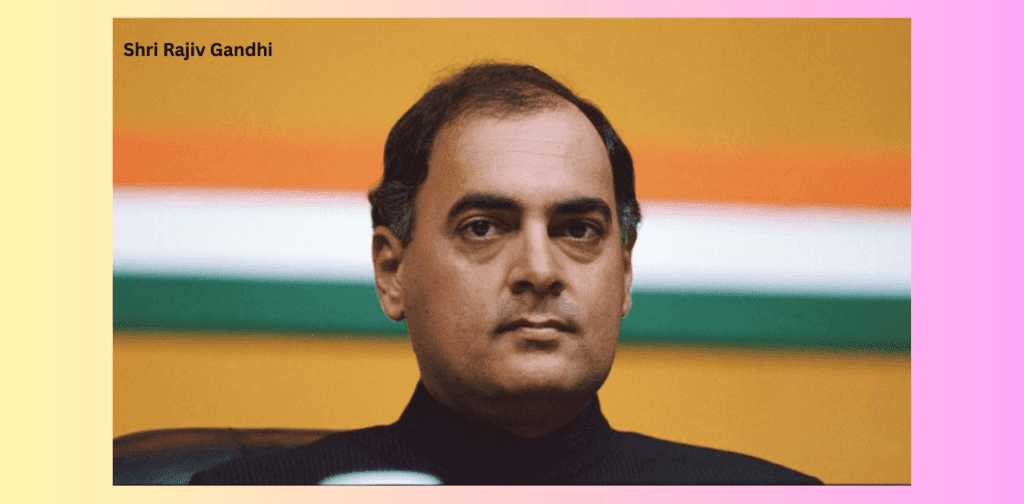“At the age of 40, Mr. Rajiv Gandhi became the youngest Prime Minister of India, potentially one of the youngest elected heads of government worldwide. His mother, Smt. Indira Gandhi, assumed the role of Prime Minister in 1966 at the age of 48, making her eight years older. His esteemed grandfather, Pt. Jawaharlal Nehru, began his 17-year tenure as India’s first Prime Minister at the age of 58. Bringing about a generational shift in the nation, Shri Gandhi secured the largest mandate in the country’s history. Following the passing of his mother, he promptly called for elections to the Lok Sabha, the directly elected lower house of the Indian Parliament. In this election, the Congress party garnered a significantly higher share of the popular vote compared to the previous seven elections, capturing a record-breaking 401 seats out of 508. Leading a population of 700 million Indians at such a young age would have been impressive under any circumstances. However, what sets this achievement apart is that Shri Gandhi initially entered politics reluctantly and later than expected, despite being part of a deeply political family that had served India for four generations — both during the struggle for independence and afterward. Shri Rajiv Gandhi was born on August 20, 1944, in Bombay. He was just three years old when India gained independence, and his grandfather assumed the role of Prime Minister. His family later moved to New Delhi from Lucknow. His father, Feroze Gandhi, became a Member of Parliament (M.P.) and earned a reputation as a fearless and dedicated parliamentarian. During his early years, Rajiv Gandhi lived with his grandfather at Teen Murti House, where his mother, Indira Gandhi, played the role of the Prime Minister’s hostess. He briefly attended Welham Prep school in Dehra Dun before transferring to the residential Doon School in the foothills of the Himalayas. It was there that he forged lifelong friendships and was joined by his younger brother, Sanjay. After completing his school education, Shri Gandhi enrolled at Trinity College, Cambridge, before switching to Imperial College in London to study mechanical engineering. He openly admitted that he wasn’t particularly keen on rote learning for exams. Evidently, politics didn’t initially captivate his interest as a career path. According to his peers, his bookshelves were adorned with scientific and engineering texts rather than works on philosophy, politics, or history. Music held a special place in his heart, encompassing Western and Hindustani classical music as well as modern tunes. His hobbies also extended to photography and amateur radio. His greatest passion, however, was aviation. Consequently, after returning from England, he passed the entrance exam for the Delhi Flying Club and obtained a commercial pilot’s license. He subsequently became a pilot for Indian Airlines, the domestic carrier. During his time at Cambridge, he met Sonia Maino, an Italian studying English. They tied the knot in New Delhi in 1968 and resided in Smt. Indira Gandhi’s residence with their two children, Rahul and Priyanka. Despite the bustling political environment, their life remained primarily private. The tragic demise of his brother, Sanjay, in an airplane crash in 1980 altered this trajectory. Mounting pressures compelled Rajiv Gandhi to enter politics and support his besieged mother, who was grappling with internal and external challenges. Initially resistant, he eventually succumbed to the rationale and won a parliamentary by-election in Uttar Pradesh’s Amethi constituency following his brother’s passing. In November 1982, during India’s hosting of the Asian Games, Rajiv Gandhi oversaw the fulfillment of commitments to construct stadiums and related infrastructure. This responsibility demonstrated his capacity for efficient coordination and management. Concurrently, as General Secretary of the Congress party, he revitalized and streamlined the party organization. These skills later proved crucial during more arduous circumstances. Rajiv Gandhi’s rise to power, assuming the roles of both Prime Minister and Congress President, unfolded amidst the tragic and tumultuous aftermath of his mother’s assassination on October 31, 1984. Despite the immense personal grief and national responsibilities, he displayed remarkable composure, dignity, and restraint. Throughout the month-long election campaign, Rajiv Gandhi tirelessly traversed the country, addressing 250 meetings across numerous locations, covering a distance equivalent to one and a half times the Earth’s circumference, and engaging with millions face to face. A man characterized by modern sensibilities, decisiveness, and understated demeanor, Rajiv Gandhi thrived in the realm of high technology. His primary objectives included not only preserving India’s unity but also propelling the nation into the twenty-first century.”
